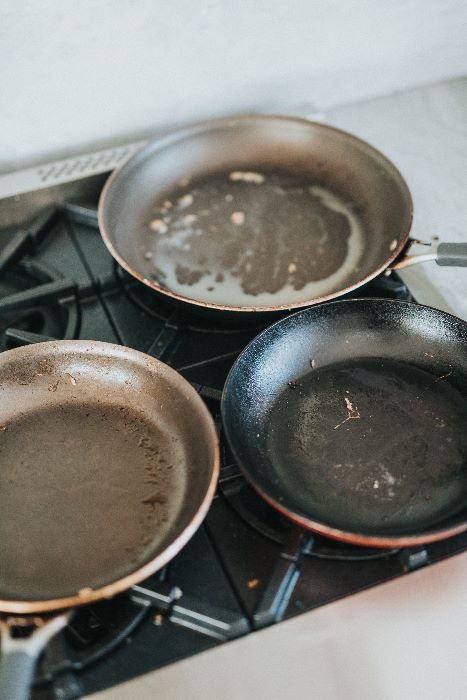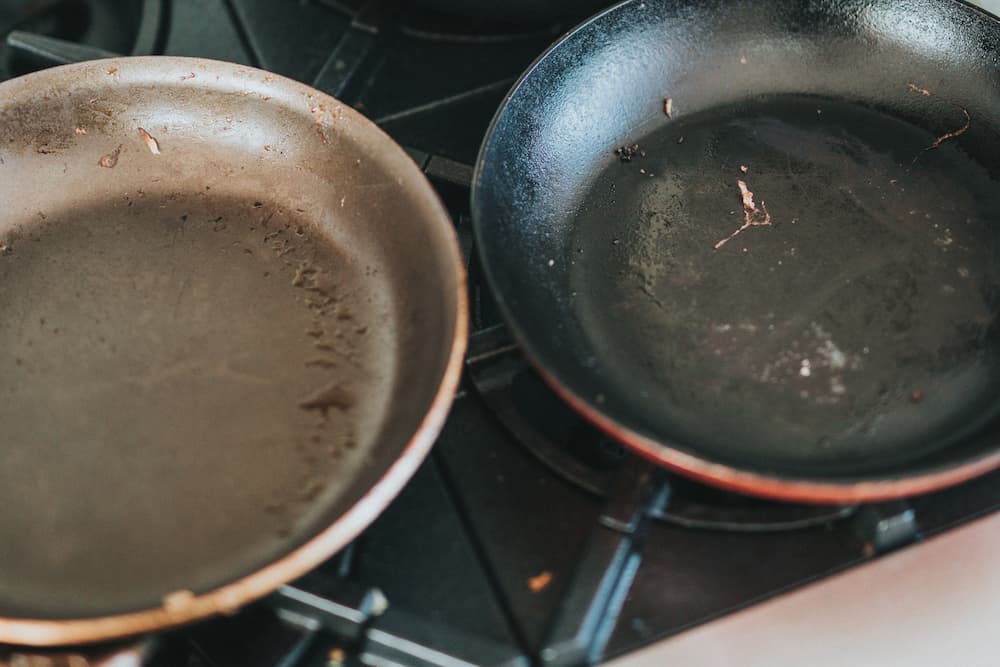How To Clean Hard Anodized Cookware Exterior & Interior
People have discovered the fantastic qualities of nonstick cookware. Knowing how to clean hard anodized cookware interior and exterior is vital before using them. We wouldn’t want you to mess up your kitchenware in the name of cleaning.
I was so curious to find out what was so special about these pots and pans that everyone was talking about. I got the answer when I bought my own set.
The hard anodized aluminum cookware enables heat to be distributed uniformly. The result is evenly cooked food. Also, the kitchenware is exceptionally durable.
Initially, I thought I could clean the hard anodized cookware just like any other pot or pan. Upon reading my Caphalon cookware manual, I realized that I had no information on how to take care of this special kitchenware.
I safely stored my precious nonstick cookware. I then searched for tips on how to clean both the inside and the outside parts of the pots and pans. This is what I learned.
Contents
How To Clean Hard Anodized Cookware Exterior?
No one likes to have dirty kitchenware. It doesn’t make sense for the interior of your cookware to be clean and the exterior to be covered in oil and various stains. Therefore, make sure to clean the outside part of your pots and pans.
In an attempt to keep the hard anodized cookware sparkling, many people often make mistakes. That is why it is essential to learn the correct way to clean the exterior of your cookware.
Use The Right Cleaning Methods
To avoid discoloration and damage, you should never wash the hard anodized aluminum pots and pans using abrasive and scratchy sponges. This information is indicated in the manuals from the manufacturers. That means no steel wool (which some people use) and no chlorine bleach.
The recommended cleaners are warm water and regular soap. You’ll then scrub the pots and pans using something soft such as a dishcloth or dish sponge.
It is tempting to use any cleaning solution on cookware but doesn’t do it. You should not use liquid household cleaners or cleaning agents meant for the oven or the floor on your nonstick cookware.
These can not only damage your pots and pans but will also make your warranty void.

Baking Powder And Water
The hard anodized nonstick cookware is porous, and so they may form stains, especially if you don’t clean them properly. Stains can also appear from burnt food.
If this happens, don’t panic and start scrubbing with steel wool. Instead, form a mixture of baking powder and water and use it to clean your kitchenware.
Soaking The Cookware
I realized in the course of my research that many homeowners also soaked their pots and pans to get rid of stains. Hot water and soap work well. After soaking, clean the pots and pans using a dishcloth and thoroughly rinse with water.
Cleaning Using A Scouring Agent
Cleaning the outside part of your nonstick cookware with a scouring agent is an excellent way of removing burns or stains. The mixture of a scouring powder and water will do the job well.
Baking Soda And Water Can Also Work
Use a soft piece of cloth to put either of the mixtures on the stains. Rub the stains and clean them with warm water.
How To Clean Hard Anodized Cookware Interior
Most people pay more attention to cleaning the interior of their cookware. This is in order because the inside part is where your food goes. Thus, it should be clean to avoid health issues. Also, clean food looks and tastes better.
Here’s how you can clean the inside of your pots and pans.
Wash Your Kitchenware Before First Use
If you have just bought your hard anodized cookware, you might be excited to use it. However, the first thing is you should clean it even if it is new.
Dip the hard anodized nonstick pots and pans in warm water with soap. Clean it properly, and then dry it afterward.
Clean After Each Use
Have you ever seen grease buildup in someone’s nonstick cookware? It doesn’t look good. Washing your hard anodized nonstick pots and pans every time you use them will avoid this mess.
Experts recommend washing your pots and pans after use. Avoid putting your nonstick cookware in cold water immediately after cooking. Let the kitchenware cool before doing that to prevent warping.
The same does not apply to hot water. You can immerse your hot hard anodized nonstick cookware in hot water, and it will not get warped.
Handwash In Hot Or Warm Water With Dish Soap
Hot or warm water with mild soap should be your best friend if you have hard anodized cookware. Washing your cookware in this solution will help it maintain its appearance for a more extended period.
Cleaning With Scouring Powders
It is okay to use some scouring powders to remove stains from your anodized cookware. However, these have to be mild. A soft-bristled cleaning brush will also get rid of stains without damaging your kitchenware.
Simmer Dish Soap Solution In The Cookware
I stumbled across an interesting way of cleaning nonstick cookware that some homeowners use. The trick involves immersing the hard anodized nonstick pots and pans in water with some dishwashing liquid.
You can then simmer the kitchenware in the water for approximately 20 minutes. Take the cookware out and let it cool for 30 minutes or more.
At this point, the stains will be loose. This will allow you to scrub them off using a soft-bristled brush. Clean the pots and pans with lots of water.
You can follow the same procedure of boiling the cookware but using water and vinegar. 5 to 10 minutes is sufficient when using vinegar.
People say that this way, they have removed even sugar stains left after reheating cinnamon rolls.
Clean With Water And Cream Of Tartar
Some people use a mixture of water and cream of tartar to remove stains. They apply the paste, leave it for 10 minutes and then scrub using a soft sponge. Although the bottom part of the pots and pans appear brighter after that, many people complain that the stains do not disappear.
You should never use a dishwasher to clean your hard anodized nonstick pots and pans. You have to do the cleaning by hand. This also applies to cleaning both the interior and the exterior parts.
Frequently Asked Questions
Can you put hard anodized cookware in the dishwasher?
No, you should not wash your hard anodized cookware in the dishwasher. Hard anodized nonstick pots and pans should be hand washed. A dishwasher can damage your cookware. Only clean the kitchenware in the dishwasher if the manufacturer’s manual says that it is okay to do that.
Is hard anodized dishwasher safe?
No, hard anodized cookware is not dishwasher safe and that is a disadvantage in the eyes of some home cooks. While washing it in the dishwasher once or twice will not ruin it, the hard anodized cookware should not be regularly washed in the dishwasher.
However, some anodized cookware sets are dishwasher safe. These are especially pots and pans whose entire hard-adonized surfaces have been subjected to total encapsulation.
Can you use steel wool on hard anodized cookware?
No. Steel wool will cause scratches and damage to your pots and pans.
How to clean hard anodized cookware before and after each use?
You should clean your hard anodized nonstick pots and pans with warm water, soap, and a soft dishcloth or sponge.
The exact process can be followed after use. However, you can also soak the cookware first before cleaning.
Conclusion
Some people are scared of buying hard anodized cookware because they don’t know how to take care of them. This is normal since you wouldn’t want to spend a lot of money on an item only to damage it.
You don’t have to worry anymore. All you need to do is arm yourself with the knowledge of how to clean the interior and exterior of your nonstick cookware.
These cleaning methods we’ve talked about help keep your pots and pans in good condition. Thus, they can continue providing you with their excellent cooking properties.
What you need to remember is that hard anodized nonstick cookware is different from ordinary cookware. That is why you should take special care when cleaning them.
All the best as you implement these tips on how to clean your nonstick cookware.
